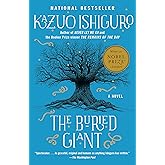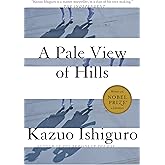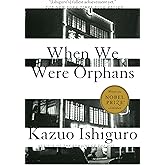
Download the free Kindle app and start reading Kindle books instantly on your smartphone, tablet, or computer - no Kindle device required.
Read instantly on your browser with Kindle for Web.
Using your mobile phone camera - scan the code below and download the Kindle app.

Image Unavailable
Color:
-

-
-
- To view this video download Flash Player
-

-
 VIDEO
VIDEO -



 Audible sample
Audible sample Klara and the Sun Paperback – February 27, 2021
Purchase options and add-ons
- Print length352 pages
- LanguageEnglish
- PublisherFABER ET FABER
- Publication dateFebruary 27, 2021
- Dimensions9.17 x 1.06 x 6.02 inches
- ISBN-100571364888
- ISBN-13978-0571364886
Book recommendations, author interviews, editors' picks, and more. Read it now.
Frequently bought together

Customers who viewed this item also viewed
 ‘Yes. Until recently, I didn’t think that humans could choose loneliness. That there were sometimes forces more powerful than the wish to avoid loneliness.’Highlighted by 4,626 Kindle readers
‘Yes. Until recently, I didn’t think that humans could choose loneliness. That there were sometimes forces more powerful than the wish to avoid loneliness.’Highlighted by 4,626 Kindle readers ‘Sufficiently generous and liberal to be open to all students of high caliber, even some who haven’t benefited from genetic editing.’Highlighted by 4,523 Kindle readers
‘Sufficiently generous and liberal to be open to all students of high caliber, even some who haven’t benefited from genetic editing.’Highlighted by 4,523 Kindle readers ‘Sometimes,’ she said, ‘at special moments like that, people feel a pain alongside their happiness. I’m glad you watch everything so carefully, Klara.’Highlighted by 3,801 Kindle readers
‘Sometimes,’ she said, ‘at special moments like that, people feel a pain alongside their happiness. I’m glad you watch everything so carefully, Klara.’Highlighted by 3,801 Kindle readers
From the Publisher







Kazuo Ishiguro was born in Nagasaki, Japan, in 1954 and moved to Britain at the age of five. His eight previous works of fiction have earned him many honours around the world, including the Nobel Prize in Literature and the Booker Prize. His work has been translated into over fifty languages and The Remains of the Day and Never Let Me Go, both made into acclaimed films, have sold over a million copies each in Faber editions. He was given a knighthood in 2018 for Services to Literature. He also holds the decorations of Chevalier de l’Ordre des Arts et des Lettres from France and the Order of the Rising Sun, Gold and Silver Star from Japan.
Product details
- Publisher : FABER ET FABER (February 27, 2021)
- Language : English
- Paperback : 352 pages
- ISBN-10 : 0571364888
- ISBN-13 : 978-0571364886
- Item Weight : 14.1 ounces
- Dimensions : 9.17 x 1.06 x 6.02 inches
- Best Sellers Rank: #803,277 in Books (See Top 100 in Books)
- Customer Reviews:
About the author

KAZUO ISHIGURO was born in Nagasaki, Japan, in 1954 and moved to Britain at the age of five. His eight previous works of fiction have earned him many honors around the world, including the Nobel Prize in Literature and the Booker Prize. His work has been translated into over fifty languages, and The Remains of the Day and Never Let Me Go, both made into acclaimed films, have each sold more than 2 million copies. He was given a knighthood in 2018 for Services to Literature. He also holds the decorations of Chevalier de l'Ordre des Arts et des Lettres from France and the Order of the Rising Sun, Gold and Silver Star from Japan.
Customer reviews
Customer Reviews, including Product Star Ratings help customers to learn more about the product and decide whether it is the right product for them.
To calculate the overall star rating and percentage breakdown by star, we don’t use a simple average. Instead, our system considers things like how recent a review is and if the reviewer bought the item on Amazon. It also analyzed reviews to verify trustworthiness.
Learn more how customers reviews work on AmazonCustomers say
Customers find the book compelling and thought-provoking, with wonderful prose and a moving character development that explores the complexities of the human heart. Moreover, the story highlights empathy and understanding, making it emotionally impactful. However, customers disagree on the pacing, with some finding it slow going at first. Additionally, the book receives mixed reactions regarding its development, with several customers describing it as tedious and under-developed.
AI-generated from the text of customer reviews
Customers find the book compelling and intriguing, with one customer noting its great verisimilitude and another highlighting its heartwarming narrative about self-determination.
"...In this case, she learns very fast to accommodate to the needs and daily whims of her sick companion Josie...." Read more
"...The story takes place in the future, of course, but that future is not very clearly defined...." Read more
"I love the development of the story, the unique and creative perspective, how we learn through subtlety what is truly occurring...." Read more
"...KS_ is a fairytale of the modern times, dealing, as any fairytale, with the anxieties of its era: machines taking the place of humans, substitutions..." Read more
Customers praise the writing quality of the book, noting its wonderful prose and clean style, with one customer highlighting its first-person narrative approach.
"...But the whole book is a series of references. The writing is very clean and you can read the book in a relatively short period of time...." Read more
"...is a delicate fairytale quality in this novel that permeates Klara's voice as the narrator...." Read more
"The novel is narrated by AI in the form of a robot named Klara who is purchased by the family of a girl who suffers from a potentially fatal illness...." Read more
"...The author’s use of simple language to convey a complicated story was superb. I became absorbed never loosing interest...." Read more
Customers find the book thought-provoking, with one review highlighting its deep exploration of existential questions and interesting commentary on society.
"...emotions, thoughts like us, human beings, having an advanced ability to observe, remember, reason logically and above all, learn from her daily..." Read more
"...She is genuinely advanced in some areas but rudimentary in others. There is a whiff of consciousness...." Read more
"...It is a study about illness, love, tenderness, faith, all interpreted or acted upon by a being that is not human..." Read more
"...I became absorbed never loosing interest...." Read more
Customers appreciate the character development in the book, noting how it explores the complexities of the human heart, with one customer highlighting the unique perspective of an alien character.
"...to observe, remember, reason logically and above all, learn from her daily experiences...." Read more
"...There are also many thematic parallels, not only about human genetics, and genetic editing, but also in the way beings (be them clones or robots)..." Read more
"It wasn’t till I was near the end that I realized this remarkable character-driven sci-fi saga about an AI robot..." Read more
"...The human characters are not developed in depth, more as a matter of style, I think, than oversight...." Read more
Customers find the book emotionally impactful, highlighting its selfless love and empathy, with one customer describing it as a heartfelt story of love and courage.
"...As as AF, Klara surprisingly also suppressed her own feelings of rejection, sometimes scornful reactions from others to loyally support Josie...." Read more
"...His books are always poignant and sad." Read more
"...memories about Never Let Me Go, specially the kind of decency and tenderness that Ishiguro masterfully embeds into the action and reactions of his..." Read more
"...is personified by Klara, and described as giving life saving and healing power, but seemingly at his own discretion when he chooses to help or not..." Read more
Customers have mixed reactions to the emotional content of the book, with some finding it heartbreaking and sad on many levels, while others note it lacks emotional depth.
"...There is a whiff of consciousness...." Read more
"...and faith, the plumbing of philosophic depths in this novel is rather too simplistic...." Read more
"...His books are always poignant and sad." Read more
"...it is in Ishiguro's narration through Klara that makes this a touching but sad book, which I have a feeling may have gotten its start as a vision of..." Read more
Customers have mixed opinions about the pacing of the book, with some finding it very moving and pulling them into the story quickly, while others mention it starts slow and takes time to get going.
"...The writing is very clean and you can read the book in a relatively short period of time. Definitely not a slog...." Read more
"...However, the author begins an at first slow descent into madness, and about two thirds of the way through it begins to utterly fall off a cliff...." Read more
"A great story. A real page turner" Read more
"...little information to the reader, making this story heartbreaking and moving...." Read more
Customers find the book's development unsatisfactory, describing it as tedious, almost nonsensical, and too under-developed.
"...there is some other hidden message beneath that, as her development seems somewhat haphazard, and not shaped in your usual character arc...." Read more
"...of the story, about love and loss and spirituality was mundane and felt lazy ...." Read more
"...On a personal note, the final part (part 6), is particularly challenging...." Read more
"...The human characters in the story are conflicted, complex, and not always rational. Klara is oddly more sensible, and more lovable...." Read more
Reviews with images
A book hard to forget
Top reviews from the United States
There was a problem filtering reviews. Please reload the page.
- Reviewed in the United States on May 26, 2021I had read other novels by Kazuo Ishiguro, loved them for its simple but deep and insightful thoughts. This latest novel deals with the contemporary topic of robots, artificial intelligence and its impact to our near future. It is the time that we can buy or order a robot or AF (Artificial Friend) to meet our needs. In this case, a mother bought an AF named Klara to be a companion/assistant/helper/confidante to her sick daughter Josie. Kazuo presented this story differently than other authors in that he narrated it from the perspective of AF Klara as a person throughout the story. Reading thru the novel, readers will soon forget that Klara is a robot since she has feelings, emotions, thoughts like us, human beings, having an advanced ability to observe, remember, reason logically and above all, learn from her daily experiences. In this case, she learns very fast to accommodate to the needs and daily whims of her sick companion Josie. As the story evolves, Klara learned or started to developed feelings for Josie such as loyalty, empathy, friendship, sadness. Klara transformed from a robot at the service of its master to a dedicated friend who is looking for ways to make Josie's day brighter. In mid-story, Klara was engaging Rick who was an old childhood friend of Josie but somehow drifted apart, to come back to Josie to help her with her sickness. As as AF, Klara surprisingly also suppressed her own feelings of rejection, sometimes scornful reactions from others to loyally support Josie. In the latter part of the novel, Klara explored metaphysical thoughts like faith with her god (The Sun), memory of a dear person after death and even sacrificing herself to replace Josie in an act of selfless love. But even with her super faculties, Klara understood her limits realizing that love is not a concept that can be learned. At the end of story, Klara even thought she accomplished her mission which is to help Josie overcome her illness had to deal with her age and usefulness as an AF. Even an AF is becoming old, outdated and as all physical things, will be sent to a lonely place to die. At the end, one can't help to love Klara as a human being, to feel for her dedication, loneliness and sad destiny. In many ways, Klara has learned to become better than us because she expressed no bitter remorse and ill feelings about her destiny. After finishing the novel, I have a perplexing thought about the role of AF in our future technological society. What role do we want an AF to be, a helper in daily chores, companion in lonely times, a friend to confide in, a protective mother-to-be or a person who we can learn from ?
- Reviewed in the United States on March 6, 2021This is the first book I have read by Kazuo Ishiguro. And according to the professional reviewers one of his common themes is the exploration of what it means to be human, which love is a big part of. And this book certainly fits.
The narrator is a robot named Klara, an AF (artificial friend) meant to be a companion to a teenage girl named Josie. The story takes place in the future, of course, but that future is not very clearly defined. There is a reference to massive social upheaval caused by the advancement of AI, a predictable backlash from the humans who are disaffected, and the implication of anarchy. There is even a specific reference to fascism.
But the whole book is a series of references. The writing is very clean and you can read the book in a relatively short period of time. Definitely not a slog. But many questions go unanswered and vague is a defining characteristic. In many ways, in fact, both the writing style and the reliance on vague implication often made me think of Eastern poetry (I am a fan) in narrative form.
As other reviewers have noted, the book leaves you with an overall sense of sadness, but I would call it emptiness because it is more of a perspective than an emotion. It just is, which is largely the way Klara sees and experiences the world.
Having given it much thought over the years, it is very doubtful to me that artificial people will develop along the path that Klara is on. She is genuinely advanced in some areas but rudimentary in others. There is a whiff of consciousness. Klara picks up on innuendo and interprets her observations in ways suggestive of the most observant and sensitive of humans, but has a very limited knowledge of the larger world. She doesn’t, for example, understand the purpose of the simplest machines.
There is a great deal of ink devoted to how Klara sees the world. It often involves geometric shapes and the deception of angle, point of view, and lighting. That, however, is never fully linked to the main narrative.
The human characters are not developed in depth, more as a matter of style, I think, than oversight. And there are many storylines that are never quite filled in, again, I think, due to matters of style.
The mother presents the most complex and inscrutable character to me. We are often presented with somewhat lengthy narratives that are just left in total isolation. Often contradictory, these dialogues are never fully explained or again referenced as the narrative unfolds.
In the end, the author’s perspective on what it means to be human is vague, like the book itself. The basic question seems to be whether or not humans have an inexplicable dimension that will never be replicated artificially or are predictable in a way we may not yet understand, but which there is a knowable pattern to.
I, for one, believe it will be decades before robots are even remotely human. They will do amazing things and will learn much more than we can individually know. That, however, is where we live, not what we know and feel.
One of the reasons for that is that artificial intelligence is incapable of making mistakes. It can clearly be wrong and make terrible choices. That, however, is the fault of the person creating the artificial intelligence, not the intelligence itself. And that is exactly why we must be so careful in pursuing a future dominated by AI. Humans are more than capable of making mistakes, even ones that will ultimately destroy us.
In the end, I will probably buy another one of this author’s books. I will wait a while, however. I need to fully digest this one first. That, in the end, is my standard of a good book.
- Reviewed in the United States on May 3, 2025I love the development of the story, the unique and creative perspective, how we learn through subtlety what is truly occurring. His books are always poignant and sad.
Top reviews from other countries
-
 Carlos Vivanco PastoreReviewed in Spain on November 24, 2024
Carlos Vivanco PastoreReviewed in Spain on November 24, 20245.0 out of 5 stars Realmente bueno. Cómo siempre
Una vez más Kazuo Ishiguro no decepciona. Su inglés es elegante, simple, lleno de sentimientos y detalles. He leído varios de sus trabajos y nunca me ha aburrido ni desencantado. Vale la pena.
 Alexander O MartinezReviewed in Italy on April 6, 2025
Alexander O MartinezReviewed in Italy on April 6, 20255.0 out of 5 stars Good read
Very good book! Highly recommend
 BookWormReviewed in the United Kingdom on December 27, 2021
BookWormReviewed in the United Kingdom on December 27, 20215.0 out of 5 stars Beautifully understated, moving and thought-provoking
It takes a few years for Kazuo Ishiguro to write each of his novels, in keeping with his restrained, careful style. But they are usually worth waiting for - and this one is especially so. Reading this makes you realise what a deserving winner of various prizes he is - including the Nobel Literature prize. He is the grand master of the old literary adage 'show, don't tell'. Ishiguro almost never explicitly states anything - but you are never in any doubt about what he wants to get across. His writing is so subtle, so clever that the reader discovers everything about the characters and their situation for themselves, in a natural way.
This is particularly unusual in a science fiction novel like 'Klara and the Sun'. Any other author would have needed to explain the concepts, give the bigger picture, construct a history. introduce some technical information. Ishiguro does not. He allows the reader to build up their own picture and knowledge gradually - and without anything being spelt out, I feel I understood everything I needed to. In fact, extra 'factual' information would have got in the way of my appreciation of and absorption in the story. The restraint is really admirable - I don't doubt Ishiguro knew more about the world he wrote about - he isn't missing details for lack of ability to invent them. All too often authors overdo their excitement to show how thoroughly they have researched or imagined something. This is never the case here.
The story is narrated by Klara, a robot who works as an 'artificial friend' for a teenage girl named Josie. It becomes clear that Josie is ill, perhaps terminally so. Klara, who is solar powered, has a near-religious belief in the sun and its ability to heal. So she sets out to beg the sun to cure her owner. Of course, the reader knows that her faith in the sun is based on a series of misunderstandings and aches for poor Klara as she attempts to gain comfort and hope - and becomes increasingly worried as her attempts to fulfil the sun's 'wishes' might lead her into danger.
Klara is an extremely sympathetic and likeable narrator. Although she is a robot, I don't think anyone who read this book would doubt she had feelings and think of her as in some way human. There is nothing clinical about her, and she is full of compassion and empathy. It does make you think about the big questions of what it means to be human, and about how we should treat and interact with artificial intelligences in the future. Is Klara just like a 'vacuum cleaner' as someone describes her, or is she more akin to a person, with rights of her own? Is her intelligence something to be valued and protected in its own right?
Besides the questions about artificial intelligences, there is also an important theme about the potential for genetic modification and enhancement of human beings. The novel's world sees a two tier society, with only children who have had genetic enhancements able to go to university and get well paid work. But the enhancements are not risk free. It's a scenario that could easily play out in the future. Ishiguro doesn't give any answers, he just presents the situation and shows some people affected by it.
The other thing I really liked about Ishiguro's depiction of Klara is something you rarely find in novels about robots/artificial intelligences, and that's her imperfections. For example, Klara often describes seeing things in 'boxes' which you presume is due to delays in interfacing the feeds from her various camera sensors. Sometimes things become jumbled, particularly in bright light. And she struggles to walk on uneven surfaces. These little things give the reader the sense they are genuinely seeing things from the perspective of a different kind of being, and makes Klara all the more believable and (bizarrely) 'human'. Too often robots in sci-fi works are near perfect, with multiple superhuman abilities. The reality is probably much closer to Klara - extraordinary, but still not quite like a human and with certain imperfections/differences.
Ultimately this is a very thought provoking and beautifully written novel that at its heart is about love and compassion. Klara's touching and irrational faith in the sun and its ability to heal the ailing Josie drive the narrative and provide a tear-jerking emotional core to the story. I am certain that this will be remembered as one of Ishiguro's finest and most interesting novels.
 Danger MouseReviewed in Australia on July 26, 2021
Danger MouseReviewed in Australia on July 26, 20215.0 out of 5 stars A beautiful and poignant dystopian novel
Klara and the Sun is the eighth novel of this very accomplished Nobel Prize and Booker Prize winning author Kazuo Ishiguro. Like most of his other novels he conjures the trick of using deceptively simple language to overlay a deeper and richer meaning. Often the little details left out allow the reader speculate beyond what is told.
The novel holds true to the authors belief that he has secretly re-written the same story. In this idea, the novel is arguably most similar to his novel “Never let me go” that also mused upon what it is to be not quite human. However in this novel, genetic clones raised to harvest organs for medical treatments is replaced with artificial intelligence or what the book calls AFs.
Klara, our narrator, is an AF (Artificial Friend) designed to give company to lonely children in an isolated, polluted and angst ridden future. Through Klara’s keen perception the world in the novel gradually reveals itself. Children are “lifted” implying that they are genetically altered to improve their aptitude and chance of success in life. Classes are divided between the genetic haves and have not and even this lifting process is not without potentially fatal consequences.
Although the story is slow paced, the reveals are well worth while and Klara’s endearing and innocent observations of the world create a beautiful and poignant foil, juxtaposed against a grim and sinister reality that lurks just below the surface.
Like “Never let me go” this feels like a YA dystopian sci-fi novel but is so much more. Only a truly impressive author could pull this off.
 DianaReviewed in Sweden on January 26, 2025
DianaReviewed in Sweden on January 26, 20255.0 out of 5 stars Great book!
Great book! I strongly recommend it. From the eyes of an artificial friend we could see what it means to be a human. Motivates a reader to reflect on humans behaviour.
















